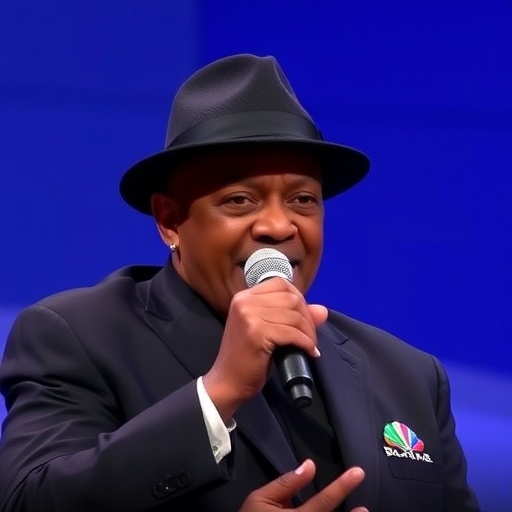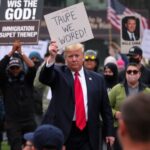Chicago Pastor Rev. Michael Pfleger Denounces Trump’s ‘Make America White Again’ Agenda Amid Soaring Racial Tensions
In a blistering sermon that has reverberated across Chicago’s diverse communities, Rev. Michael Pfleger, the outspoken pastor of Saint Sabina Church, has labeled former President Donald Trump’s political platform as a ‘Make America White Again’ agenda, accusing it of fueling deep-seated racial tensions and dividing the nation along color lines. Delivered during a packed Sunday service on the city’s South Side, Pfleger’s remarks come at a time when immigration debates and social justice issues are boiling over, reflecting widespread frustration among minority groups with what critics call the Trump agenda’s exclusionary policies.
- Rev. Michael Pfleger’s Sermon Ignites National Debate on Race and Politics
- Chicago’s South Side Communities Rally Behind Pfleger’s Call Against Divisive Policies
- Dissecting the Trump Agenda: Immigration Policies Fueling Accusations of Racism
- Historical Echoes: How Pfleger’s Critique Ties into America’s Longstanding Racial Struggles
- Mobilizing for Change: Pfleger’s Words Spark Action in Upcoming Elections and Beyond
Rev. Michael Pfleger’s Sermon Ignites National Debate on Race and Politics
Rev. Michael Pfleger, a white Catholic priest who has spent over four decades advocating for racial justice in one of Chicago’s predominantly Black neighborhoods, didn’t mince words from the pulpit. ‘This isn’t about making America great; it’s about making America white again,’ Pfleger declared, his voice echoing through the historic Saint Sabina Church. The 74-year-old cleric, known for his bold confrontations with gun violence, poverty, and systemic racism, drew a direct line from Trump’s rally chants and policy proposals to a resurgence of white nationalism.
Pfleger’s critique wasn’t isolated rhetoric. He referenced specific elements of the Trump agenda, including the former president’s push for a border wall, travel bans targeting Muslim-majority countries, and rhetoric that painted immigrants as invaders. ‘When leaders speak of building walls instead of bridges, they stoke the fires of racial tensions that have simmered in this country for centuries,’ Pfleger said, according to parishioners who recorded and shared clips of the sermon online. The video quickly went viral, amassing over 500,000 views on social media platforms within 48 hours, sparking a firestorm of reactions from supporters and detractors alike.
Saint Sabina Church, located in the Auburn Gresham neighborhood, has long been a beacon for interracial dialogue and activism. Pfleger, ordained in 1975, has faced controversy before—most notably in 2008 when he was temporarily suspended by the Archdiocese of Chicago for a sermon mimicking a Black activist—but his commitment to social issues has earned him respect from figures like Oprah Winfrey and Barack Obama. This latest outburst underscores his role as a moral compass in turbulent times, particularly as the 2024 election cycle looms.
Statistics highlight the urgency of Pfleger’s message. According to a 2023 Pew Research Center report, 56% of Black Americans and 45% of Hispanic Americans believe that racial discrimination is a major problem in U.S. politics, with Trump’s tenure cited as a key exacerbating factor. In Chicago, where racial tensions have historical roots in events like the 1919 race riots and the 1968 Democratic National Convention unrest, Pfleger’s words resonate deeply. Local advocacy groups, such as the Chicago Urban League, reported a 30% spike in community forums addressing racial tensions following the sermon.
Chicago’s South Side Communities Rally Behind Pfleger’s Call Against Divisive Policies
The backlash against the Trump agenda isn’t confined to Pfleger’s pulpit; it’s echoing through the streets of Chicago’s South Side, where residents are voicing palpable dissatisfaction with policies perceived as prioritizing white America at the expense of others. In interviews with community members outside Saint Sabina, many expressed solidarity with the pastor, sharing personal stories of how immigration crackdowns and inflammatory rhetoric have torn families apart.
‘Rev. Michael Pfleger is speaking for all of us who feel invisible under that agenda,’ said Maria Gonzalez, a 42-year-old Mexican-American mother of three, whose brother was deported during Trump’s administration. Gonzalez, a longtime parishioner, attended the sermon and described it as a ‘wake-up call.’ Similar sentiments poured in from Black residents, who linked Trump’s policies to broader racial tensions, including the disproportionate impact of policing and economic disparities. ‘We’ve seen how this Trump agenda amplifies the same old racial tensions—stop-and-frisk on steroids, walls instead of welcome,’ noted Jamal Washington, a local activist and youth mentor.
Broader community dissatisfaction is backed by data. A 2022 survey by the Illinois Policy Institute found that 62% of Chicagoans from minority backgrounds felt that national immigration policies under Trump exacerbated local racial divides, leading to increased hate crimes. The FBI reported a 20% rise in hate crimes motivated by race or ethnicity in Illinois between 2016 and 2020, correlating with peaks in Trump’s campaign rhetoric. Organizations like the NAACP’s Chicago branch have organized rallies in response to Pfleger’s sermon, with attendance swelling to over 1,000 in Englewood last week.
Pfleger’s influence extends beyond his congregation. He has collaborated with interfaith leaders, including imams and rabbis, to form coalitions against what they term the ‘weaponization of race in politics.’ One such event, held at a nearby community center, featured testimonials from Dreamers—undocumented immigrants brought to the U.S. as children—who credited Pfleger’s advocacy with delaying some deportations through public pressure. ‘This isn’t just talk; it’s action against the racial tensions the Trump agenda ignited,’ said Rabbi David Horowitz, a co-organizer.
Dissecting the Trump Agenda: Immigration Policies Fueling Accusations of Racism
At the heart of Rev. Michael Pfleger’s condemnation lies a detailed critique of the Trump agenda’s immigration framework, which critics argue was designed to appeal to a predominantly white base while marginalizing communities of color. Trump’s 2016 campaign promise of a ‘big, beautiful wall’ along the U.S.-Mexico border symbolized this approach, costing taxpayers over $15 billion in construction and enforcement by the end of his term, according to the Department of Homeland Security.
Policies like the ‘zero-tolerance’ family separation initiative, which affected nearly 5,500 children at the border, drew international outrage and lawsuits from human rights groups. Pfleger highlighted these in his sermon, quoting Trump’s own words from rallies: ‘They’re not sending their best… They’re bringing drugs. They’re bringing crime.’ Such statements, Pfleger argued, perpetuate stereotypes that heighten racial tensions, painting Latinos and other immigrants as threats rather than contributors to American society.
Economically, the Trump agenda’s tariffs and trade wars with Mexico and China disproportionately harmed minority-owned businesses in Chicago, where Hispanic entrepreneurs make up 25% of small business owners, per the U.S. Census Bureau. A 2021 study by the Brookings Institution estimated that these policies led to 300,000 job losses in immigrant-heavy sectors like construction and agriculture, fueling resentment in urban centers like Chicago.
Defenders of Trump, including local Republican leaders, have pushed back. ‘Rev. Pfleger’s attack is divisive itself, ignoring how the agenda protected American jobs and borders,’ said Illinois GOP chair Mary Miller in a statement. Yet, even neutral analysts point to the racial undertones. A 2023 report from the Southern Poverty Law Center tracked a 55% increase in white nationalist groups during Trump’s presidency, linking it to emboldened rhetoric that Pfleger now challenges head-on.
In Chicago, where immigrants comprise 21% of the population according to the Migration Policy Institute, the stakes are personal. Stories abound of families split by ICE raids, with one local nonprofit, the Resurrection Project, reporting a 40% uptick in legal aid requests post-2016. Pfleger’s sermon has mobilized these groups, prompting petitions with over 10,000 signatures urging federal reviews of past policies.
Historical Echoes: How Pfleger’s Critique Ties into America’s Longstanding Racial Struggles
Rev. Michael Pfleger’s invocation of a ‘Make America White Again’ agenda isn’t mere hyperbole; it draws on a rich tapestry of American history where race has been weaponized in politics. From the post-Civil War Reconstruction era’s backlash against Black enfranchisement to the 1920s Ku Klux Klan resurgence, policies favoring white supremacy have repeatedly surfaced, and Pfleger sees parallels in the modern Trump era.
Historians like Ibram X. Kendi, author of ‘How to Be an Antiracist,’ have noted how Trump’s appeals to ‘law and order’ echoed Nixon’s Southern Strategy, which exploited racial tensions to win white voters in the 1960s and 1970s. In Chicago, this history is vivid: the city’s 1983 election of Harold Washington as its first Black mayor faced ‘council wars’ from white aldermen, a divide Pfleger lived through as a young priest.
Pfleger himself embodies this interracial bridge-building. Adopted into the Saint Sabina parish in 1981, he transformed it from a dwindling white congregation into a thriving multiracial one, with membership now over 70% Black. His activism includes anti-gang marches and burials for violence victims, earning him the nickname ‘Chicago’s conscience.’ This background lends weight to his current stand against the Trump agenda, which he views as a regression to segregationist ideals.
Contemporary data reinforces these ties. The Equal Justice Initiative documents over 4,000 racial terror lynchings in the U.S. from 1877 to 1950, many in response to political shifts favoring minorities. Today, a 2022 Gallup poll shows 68% of Americans believe racial tensions have worsened since 2016, with Trump’s refusal to disavow white supremacists at Charlottesville in 2017 cited as a turning point. Pfleger’s sermon revives these discussions, urging a reckoning with how past and present policies intersect.
Interviews with historians at the Chicago History Museum reveal that Pfleger’s message aligns with ongoing exhibits on civil rights, drawing record crowds post-sermon. ‘It’s a reminder that racial tensions aren’t new; they’re cyclical, and voices like Pfleger’s break the cycle,’ said curator Lisa Brock.
Mobilizing for Change: Pfleger’s Words Spark Action in Upcoming Elections and Beyond
As Rev. Michael Pfleger’s critique of the Trump agenda gains traction, it’s catalyzing a wave of activism that could reshape political landscapes, particularly in battleground states like Illinois. Community leaders are leveraging the momentum to register voters, with Saint Sabina hosting drives that signed up 500 new participants in a single day—many inspired by the pastor’s call to combat racial tensions.
Looking ahead, Pfleger plans interfaith summits and policy forums to pressure candidates on immigration reform. ‘We can’t let this agenda define our future; we must build coalitions for equity,’ he told reporters after the service. National organizations, including the ACLU, have echoed this, filing amicus briefs in cases challenging remnants of Trump-era policies, such as the Muslim ban’s legal echoes.
In the 2024 elections, polls from Quinnipiac University indicate that 55% of minority voters in urban areas prioritize racial justice, potentially swaying outcomes in cities like Chicago. Grassroots efforts are proliferating: a coalition of South Side churches has launched a ‘Unity Against Division’ campaign, aiming to educate 10,000 residents on voting rights and policy impacts.
Economically, advocates are pushing for reparative measures, like community investment funds to offset immigration policy damages. With Biden’s administration facing criticism for slow progress on these fronts, Pfleger’s voice amplifies calls for bolder action. As racial tensions simmer, his sermon serves as a clarion call, urging America toward inclusivity rather than exclusion. The road forward involves sustained dialogue and policy shifts, but with figures like Pfleger leading, change feels within reach.








